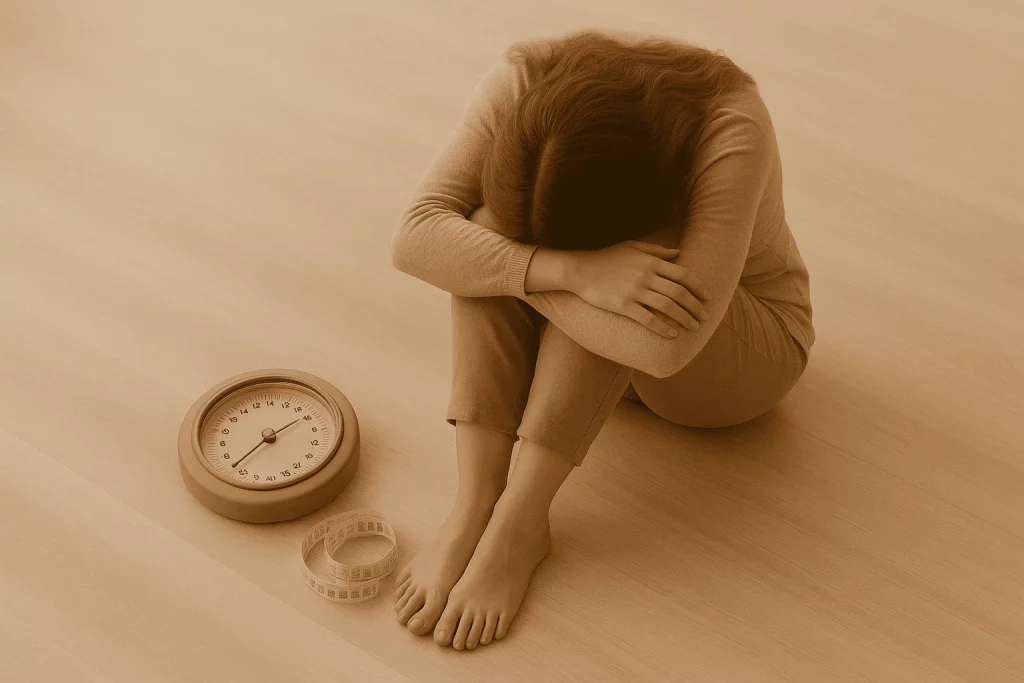Eating disorders (EDs), such as anorexia, bulimia, or binge eating disorder, are profound experiences that affect a person’s relationship with food, their body, and often, their sense of self-worth. Supporting someone going through an ED isn’t about controlling what they eat; it’s about offering a sense of presence, understanding, and emotional security.
From our psychology clinic in Valencia specializing in eating disorders (with both in-person and online options), we want to provide you with a clear and compassionate guide on how to be there for someone who needs you, without being invasive, judgmental, or rushing the process.
What Are Eating Disorders (EDs)?
Main Types of EDs and Their Characteristics
EDs include diagnoses such as:
- Anorexia nervosa: food restriction and intense fear of gaining weight.
- Bulimia nervosa: binge eating followed by compensatory behaviors like vomiting.
- Binge eating disorder: episodes of compulsive eating without compensatory
behaviors.
While each manifests differently, all share a painful relationship with the body, food, and
control
Factors Influencing the Development of an ED
There isn’t a single cause.
There is no single cause. Sometimes, it starts from insecurity triggered by a comment or a stressful phase. Other times, deeper wounds are involved: past trauma, a need to feel “enough,” or emotional pain that couldn’t be expressed. When emotions lack words, they often express themselves through the body—and food becomes the battlefield.
Behind an ED is an attempt to protect oneself.

Signs and Symptoms to Detect an ED in a Loved One
Physical and Emotional Changes to Look Out For
EDs aren’t always visible at first. Small changes may indicate something is wrong:
- Body changes: rapid weight loss or gain, fatigue, dizziness, new digestive issues.
- Emotional changes: irritability, hypersensitivity, withdrawal from social interactions.
- Behavioral changes: avoiding meals with others, talking excessively about calories
or guilt, or retreating after meals.
Key: Observe with love and concern, not judgment. If something worries you, it may be
time to approach the person—not to confront, but to be present.
How to Identify Concerning Behaviors Without Invading Privacy
You don’t always need direct questions. Observing from a place of care can reveal:
Avoiding group meals, making excuses not to eat, excessive exercise, or hiding in the bathroom after eating.
The goal: Stay attentive and available without controlling or forcing. Let the person know you are there if they ever want to talk.
How to Talk to Someone Who Might Have an ED
Tips for Starting the Conversation
Choose a calm, private moment.
Start from concern for their well-being, not food:
“I’ve noticed you seem a bit down lately, and I’m worried… how are you feeling?”
Listen more than you speak. They don’t need immediate solutions—just a safe presence.
What to Say and What to Avoid During the Conversation
Helpful phrases:
“I care about you. I’m here for you.”
“You don’t have to explain everything, but if you ever want to talk, I’ll listen.”
Avoid:
Comments about their body (“You’re very thin” or “You just need to eat”).
Pressuring or convincing. Urgency can frighten more than help.

How to Help Someone with an ED: Practical Steps
Creating a Supportive and Understanding Environment
Be present without pressure. Simply being there can be a huge support.
Suggest activities unrelated to food: walks, watching a series together, daily routines.
Validate their feelings, even if you don’t fully understand them.
Patience is not doing nothing—it’s holding space without expectation.
Facilitating Access to Specialized Help
If the person is open, gently suggest talking to a specialist:
“If you ever want to speak with someone, I can help you find the right professional. I can even accompany you if you like.”
Our clinic in Valencia and online offers careful, non-judgmental support, respecting each person’s pace.
How to Avoid Counterproductive Attitudes
Well-intentioned behaviors can backfire:
Monitoring food or insisting they eat.
Commenting on their body, even positively.
Repeating phrases like “You have to stop doing this—it’s for your own good.”
These actions often increase shame or silence. Sometimes the most therapeutic act is simply being available.
Are You Looking for Support for Yourself or Someone with an ED?
At our center in Valencia and online, we support you with sensitivity and professional experience.
Frequently Asked Questions About Helping Someone with an ED
What if the person denies they have a problem?
Denial is common. Don’t take it personally. Don’t push, but stay present. Sometimes knowing someone is there opens a door.
When Is Urgent Intervention Needed?
If physical health is at risk—fainting, extreme weight loss, risky behaviors, or self-harm thoughts—seek medical or psychological help immediately.
Is Full Recovery Possible?
Yes. Recovery is more than stopping certain behaviors; it’s learning to trust the body, oneself, and life. It takes time, support, and no guilt, but it’s possible.
How Can I Manage My Own Emotions During This Process?
It’s normal to feel drained, frustrated, or upset. Take care of yourself. You can’t sustain someone else if you’re at your limit.
Conclusion
Supporting someone battling an eating disorder is challenging and can feel overwhelming. Yet your presence can be healing—not for what you say, but for how you are there.
You don’t need all the answers. Just being there matters. And it’s okay to seek help yourself.
From our clinic in Valencia and online, we are here to accompany you—without judgment, with respect, and with care. Because nobody should go through this alone, and with time, love, and the right support, it is possible to live in peace again.
